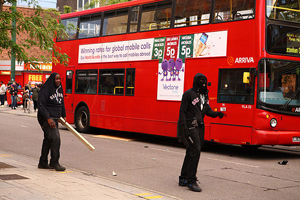
The London riots should be no surprise. Nor should the reaction. The threat of popular uprising has worried ruling classes for thousands of years, and increasingly so in recent centuries.
After all, ancient Byzantium was periodically shaken by battles of the fans of the Red and Green chariot-racing teams. That tradition of sports-inspired violence runs unbroken, right up to the June 15 Vancouver riot.
Baron Haussmann, when he redesigned Paris around 1870, knocked down blocks of tenements to make his magnificent avenues. Those avenues were to ease traffic and to give the army a clear field of fire against its own citizens. It was too easy, after all, to barricade narrow alleys in the slums.
The same idea was behind the armories of New York City and other American cities. After the horrendous Civil War riots in New York, the state government built urban castles as the headquarters for National Guard units. But they would also be refuges for the rich if and when the underclasses rose again.
But race, not wealth, has provoked most North American riots. Detroit saw a ghastly race riot in 1943 that lasted three days before federal troops ended it. I well recall the Los Angeles Watts riots in the summer of 1965, which were put down by National Guardsmen. And I also recall the summer of 1963, when as a young member of the Congress of Racial Equality, I heard a black colleague tell a TV news reporter that Watts had a riot every weekend that the media never mentioned.
We in B.C. have seen our own riots: Vancouver in 1907 watched the Asiatic Exclusion League wrecking Chinatown, only to run into violently effective resistance from the Japanese on Powell Street. We have just passed the 40th anniversary of the Gastown riots of Aug. 7, 1971, which was really a police riot.
Fighting for a good TV
When the hashtag #londonriots suddenly began to trend on Twitter, one of the most common re-tweets was the observation that while Arabs were rioting for freedom, Londoners were rioting for an HD-ready 42-inch plasma TV. And before long, the media were pointing to social exclusion as the underlying cause of the riots.
No doubt that's true to an extent, though in June we saw at least one affluent young man trying to set fire to a police car. It may be that young men of a certain age are genetically programmed to sack cities -- if an enemy's city isn't available, their own will do.
But modern riots seem to reflect a given society's definition of its lowest and highest members. In the Arab nations, only the highest have had any power. Everyone else had to vote in rigged elections and keep their mouths shut the rest of the time. The Arab spring reflects the desire of the poor and middle-class for the power of the political elite -- the power of the citizen.
In the western nations, we emphasize the consumer over the citizen. Success, after all, is little more than having the money to buy lots of very good stuff. We make celebrities out of billionaires. We define a movie's success by the millions it brings to its actors and directors. We base our hopes for the Canucks on the millions we see spent on its players.
Yes, it's too bad that folks don't turn out to vote. But it's really terrible when they don't turn out to buy. The current financial crisis boils down to the failure of the masses to buy stuff.
'We can do what we want'
But this is not from lack of desire, only lack of money. If success is defined as a 42-inch plasma TV, then a riot is simply a path to success for the impoverished. As an op-ed writer in The Guardian observed, the London riot has taken place in "a country in which the richest 10 per cent are now 100 times better off than the poorest... social mobility is worse than any other developed country." And a BBC News item taped two young women, drinking looted rosé wine, who said they were "showing the rich we can do what we want."
What they really want, of course, is to feel themselves the equals of their fellow-citizens. Better said, their fellow-consumers of wine and electronics. They accept the status quo, except that they're not getting their share of it.
London Mayor Boris Johnson has explicitly rejected this thesis, preferring to find the riots' cause in mere criminality. Others will blame the rioters' blackness, or foreignness, or class. In short, like looters, we will all take what we want from the riots.
And when the fires are finally out, some of us will sit down to watch bad programs on our new TVs, and some of us will justify the hiring of more police, or pass new anti-immigrant laws, or march in the streets in support of equality. Life will go on, and so will the riots. ![]()















Tyee Commenting Guidelines
Comments that violate guidelines risk being deleted, and violations may result in a temporary or permanent user ban. Maintain the spirit of good conversation to stay in the discussion.
*Please note The Tyee is not a forum for spreading misinformation about COVID-19, denying its existence or minimizing its risk to public health.
Do:
Do not: